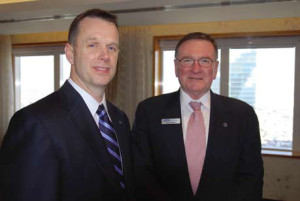Post the signing of the MoU between AHRI and ESMA, Stephen R Yurek, President of AHRI spoke to Climate Control Middle East on the implications of the agreement and the way forward.
Post the signing of the MoU between AHRI and ESMA, Stephen R Yurek, President of AHRI spoke to Climate Control Middle East on the implications of the agreement and the way forward. James Walters, the Senior Director (international Affairs) at AHRI, also contributed. Excerpts from the interview …
What does the signing of the MoU signify?

Stephen Yurek and James Walters
Stephen R Yurek: In a broad sense, the agreement is a recognition that this is not a regional market, and that equipment is about global production, be they manufactured in South America, Asia or Europe. Now a number of these products use a lot of energy. So we need standards, so products can be compared and contrasted. Being able to do so with a harmonised engineering of R&D in manufacturing will inform them what they should be doing to optimise for the region. All products can be compared locally and globally. It is possible to manufacture regionally for the global marketplace.
Considering that AHRI is quite active in advocating standards, why did it take you so long to come to the Saudi and the UAE markets?
Yurek: While it is true that energy efficiency, as an issue, has been around for a while, you have to wait till the markets mature. In the US, the maturity occurred in the 1970s and the 1980s. In Europe, they say they don’t have maturity yet. There is no national standard for equipment. Japan has gone through it. China is quickly looking at it.
As far as this region is concerned, we were waiting to see where the market was and when our potential partners were ready. Last year, they were open to these discussions. We could have come earlier, but don’t know whether or not we would have been successful. The financial crisis and the discussions in Copenhagen on climate change have made people realise and made people more focussed on energy efficiency. In Kyoto, the discussion was really left to the G20, which is a smaller group of countries. But Bali started it all, and Copenhagen had more involvement from a greater number of countries.
Having said that, we have suppliers that are already participating in certification programmes and in the writing of the standards. They would continue to participate in that as related to the UAE and Saudi Arabia.
What steps are you looking to take to localise the standards?
Yurek: When the Government sets a minimum efficiency, they need to say what temperature they are looking for. In the US, it is 95ºF; here, they may have a different temperature. We will, then, work with participants to have standards for not only for 95ºF but also for 110ºF, say.
James Walters: A key aspect of moving forward is how ESMA develops the mechanism to alter those standards. Mr Badri said we have a committee to evaluate the standards. Someone needs to take ownership of that. We will be talking to SASO and ESMA about the mechanism. We need a combined group of experts to look at that.
Considering that the UAE and Saudi Arabia (to a large extent) experience similar ambient conditions, wouldn’t it be quicker to establish a common set of standards for the GCC?
Yurek: We are hoping to work with ESMA and SASO to evolve a standard for GCC. Both Mr Mollah and Mr Badri have the same intention.
Establishing a standards regimen is one thing, but what, would you suggest, can be done to counter the scourge of counterfeiting?
Yurek: Counterfeiting is an issue not only here but also in the US and Europe. People talk about the environment, but when it comes to the bottomline, they tend to move away.
Standards and certifications provide a basis for people to compete fairly. The question is, ‘How can the standards be enforced?’ In the US, we see voluntary enforcement. People are willing to pay the money to take certification. At the end of the day, though, we can do only so much. Consumers are going to buy. When a developer says, “I will put the cheaper component”, that’s when the government needs to enforce. So you can have voluntary enforcement by the industry, and then we need government enforcement. In over 80% of the projects, you will have compliance. A minority percentage will skirt the law, just like a portion cheats on taxes. The best way to make buyers comply is to price energy correctly.
Copyright © 2006-2025 - CPI Industry. All rights reserved.